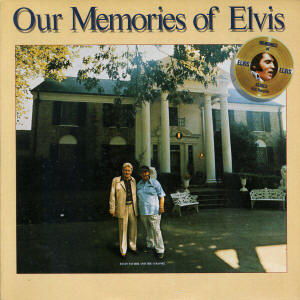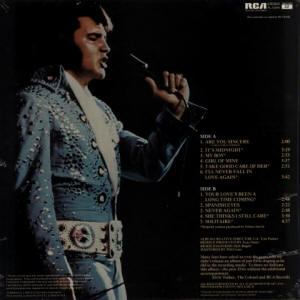

In early 1979 RCA released "Our Memories Of
Elvis". In its initial sales period 250,000
units were moved, on March 10th the album
entered Billboard's "Top LPs Chart" for seven
weeks, where it peaked at number 132. On the
"Hot Country LPs Chart" the record feared much
better. Here it was found for 28 weeks and
became a top10 hit (#6). To promote the
longplayer, RCA issued the single "Are You
Sincere" / "Solitaire", which also sold 250,000
copies and became a top10 hit on the accordant
chart. Today the physical sales would equal 312
million paid streams of the complete album. It's
not all that bad, but certainly nothing to write
home about either. Maybe this is the reason, why
Sony doesn't give "Out Memories Of Elvis" a
digital release.
Because fans and critics complained about all
the overdubbed strings, horns and voices on
Elvis' final recordings, Colonel Parker and the
management of RCA figured, that it would be a
lucrative idea to present the "real" Presley
sound. The album was produced by Joan Deary, who
previously had been responsible for "Elvis As
Recorded At Madison Square Garden" (1972) and
both volumes of "Elvis - A Legendary Performer"
(1974 and 1976). Dick Bogert was given the task
to remaster and remix the tracks and to get rid
of all the fancy stuff. Back in 1979 RCA pretended to present the
songs, as they were recorded in the studio. In
fact, Bogert just remixed the tracks and made
them sound simpler. At times he left some of the
overdubbs in place, on other occasions he
removed elements, that had been recorded during
the live sessions with Elvis.
Unusually, the cover features a photo of the
late singers father Vernon and his manager
Colonel Parker. The singer himself just was
shown on a small picture in the upper right
corner. The backside more or less mirrored the
design of the "Elvis In Concert" album.
Are You Sincere
In contrast to the other recordings on this
album, "Are You Sincere" isn't the master take.
Instead Dick Bogert used the previously
unreleased first take. There are no harmony
singers and Elvis handles the spoken part
differently to the master take. Bogert shortened
the recording, which was made on September 23rd
at the king's house in Palm Springs, by a
minute.
It's Midnight
The ballad was recorded on December 10, 1973 at
Stax in Memphis/Tennessee. The orchestra and the
harmony singers were removed, but because the
latter ones were present during the actual
session, their voices bled into Elvis'
microphone and so they still can be heared at
times.
My BoyThree days after "It's
Midnight" Elvis taped "My Boy". Once again the
orchestra and the harmony singers were removed,
besides that Mr. Bogert shortened the track by
half a minute.
Girl Of MineThis one was
also recorded at Stax, but on July 24, 1973. By
now you might guess, that the harmony voices and
the orchester were removed.
Take Good Care Of HerElvis
taped the ballad on July 21st. This time the
choir was left in place, just the orchestra
track was silenced.
I'll Never Fall In Love Again
Once again Bogert did without the orchestra, but
kept the harmony singers. Elvis recorded
"I'll Never Fall In Love Again" on February 4,
1976 at Graceland in Memphis/Tennessee.
Your Love's Been A Long Time Coming
The happy waltz was recorded on December 15,
1973 at Stax in Memphis. The version here leves
out the harmony voices and the organ.
Spanish EyesA day later
Elvis taped the classic "Spanish Eyes". Dick
Bogert silenced the orchestra and the percussion
and brought the harmony voice more to the back.
Never AgainAs usual the
orchestra and the choire were left out. The
original recording was made on February 6, 1976
at Graceland.
She Thinks I Still Care
The country classic was recorded at the same
place, but on February 2nd. The remix does
without the harmony singers and the orchestra.
SolitaireThe same applies
here. Elvis taped "Solitaire" on February 3,
1976 at Graceland.
Verdict
Elvis certainly wouldn't have agreed to
this project, because he loved the "big"
sound and never went on tour without an
orchestra and a truckload of harmony
singers. However, many tracks are
ameliorated by the "less is more" principle.

(C) RCA Victor
![]()

